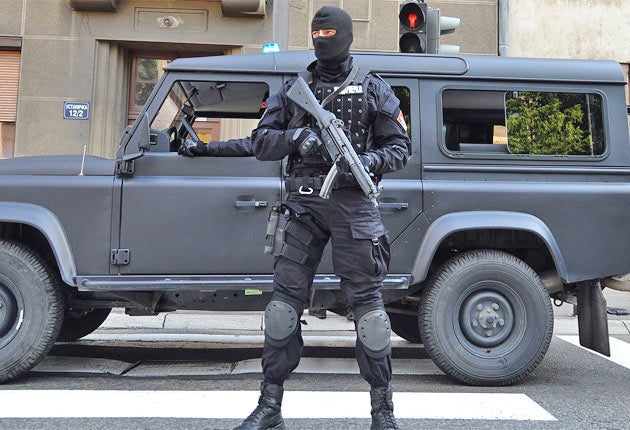Mladic extradited to The Hague after losing appeal

Your support helps us to tell the story
From reproductive rights to climate change to Big Tech, The Independent is on the ground when the story is developing. Whether it's investigating the financials of Elon Musk's pro-Trump PAC or producing our latest documentary, 'The A Word', which shines a light on the American women fighting for reproductive rights, we know how important it is to parse out the facts from the messaging.
At such a critical moment in US history, we need reporters on the ground. Your donation allows us to keep sending journalists to speak to both sides of the story.
The Independent is trusted by Americans across the entire political spectrum. And unlike many other quality news outlets, we choose not to lock Americans out of our reporting and analysis with paywalls. We believe quality journalism should be available to everyone, paid for by those who can afford it.
Your support makes all the difference.Ratko Mladic arrived in The Hague last night to face war crimes charges after a Belgrade court rejected his appeal against extradition.
Mladic was driven from his jail cell at Serbia's war crimes court to Belgrade's Nikola Tesla airport within hours of his transfer to the International Criminal Tribunal for the Former Yugoslavia (ICTY) receiving the green light from Serbia's Justice Minister, Snezana Malovic. The court and the road to the airport were closed and heavily guarded as a group of vehicles, including jeeps and police vans, sped the former Bosnian Serb army commander to a waiting Serbian government plane during what could be the 69-year-old's final moments on Serbian soil.
Mladic's lawyer Milos Saljic had filed an appeal against his extradition yesterday morning, claiming that his client was unfit to face trial and needed urgent medical attention. The plea, widely seen as a delaying tactic, was rejected immediately, allowing Ms Malovic to sign the extradition order.
Mladic has been indicted by the ICTY on 15 charges related to the killing of around 7,500 Bosnian Muslim men and boys at Srebrenica in 1995 and the 1,400-day siege of Sarajevo, during which 10,000 civilians died.
Despite the appeal, Mladic, his family and supporters have been resigned to his extradition. Early yesterday, he was allowed to visit the grave of his daughter Ana. Heavily guarded by armed security personnel and accompanied by a convoy of armoured vehicles and an ambulance, Mladic left a single candle and a small bouquet of flowers on the black marble memorial.
Ana was found shot dead in the family home in the hillside Belgrade suburb of Banovo Brdo in 1994, apparently having committed suicide using her father's pistol due to depression caused by her father's role in the Bosnian war. Mladic has always insisted that she was murdered by his enemies.
Belgrade was calm as the plane carrying Mladic lifted off, with little sign of a repeat of the nationalist protests that turned violent on Sunday night, leading to dozens of injures and more than 100 arrests. Instead, thoughts are already turning to Serbia's future.
The arrest has widely been seen as a major step towards Serbia's EU accession process. Failure to capture the alleged war criminal has been a major sticking point between Brussels and Belgrade for several years, particularly as there are widespread suspicions that Serbia was turning a blind eye to Mladic's whereabouts.
The Serbian President Boris Tadic, who has taken much of the credit for Mladic's capture outside Serbia, called in an interview on Monday for the EU to "fulfil its part" in supporting Serbia's accession bid. Serbia has signed a stabilisation and association agreement with Brussels and applied for official candidacy status in December 2009. However, it has not formally been accepted as a candidate, unlike the former Yugoslav countries Croatia, Macedonia and Montenegro, and Turkey. Croatia is expected to finalise its accession treaty next year.
Serbia's candidacy bid is due for review by the European Commission in October. Mr Tadic said that his government is "demanding that Serbia, just like Croatia, simultaneously be given the date for the start of the entry talks and not just the candidate status" as Mladic's arrest has left "no obstacles".
However, Bratislav Grubacic, a Serbian journalist and analyst, told The Independent that Serbia's road to the EU would be a long one, given the need for judicial and economic reform. Another alleged war criminal wanted by the ICTY, Goran Hadzic, is still on the loose. "Full membership and all its benefits will not come for eight to 10 years – probably not before 2020. Croatia officially became a candidate in 2003 but won't join until early 2013," Grubacic said.
Subscribe to Independent Premium to bookmark this article
Want to bookmark your favourite articles and stories to read or reference later? Start your Independent Premium subscription today.
Join our commenting forum
Join thought-provoking conversations, follow other Independent readers and see their replies
Comments